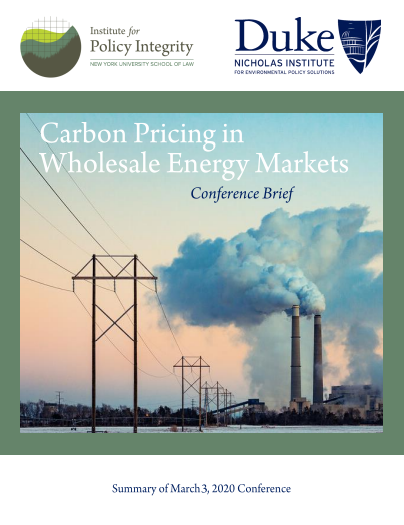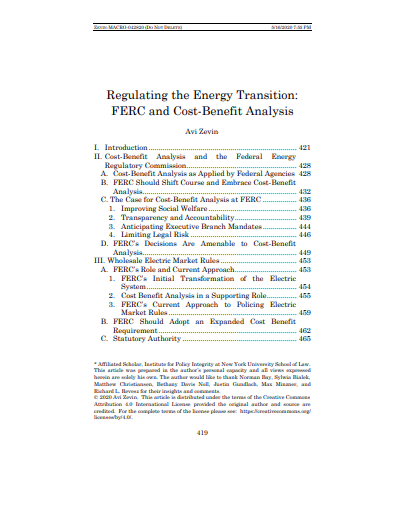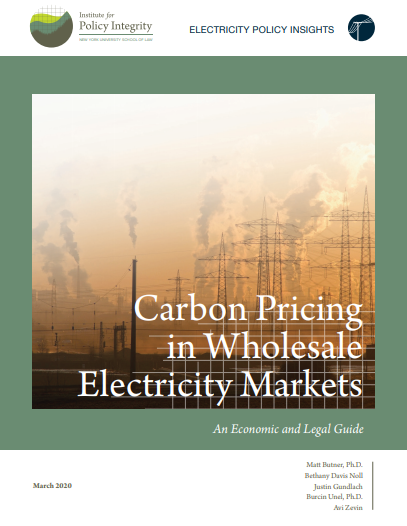-
Comments to DOE on Energy Conservation Standards for General Service Lamps
The Department of Energy (DOE) requested input on how it should conduct analysis of the efficiency, economic impact, and emissions of general service fluorescent lamps and incandescent reflector lamps. We submitted comments encouraging DOE to monetize the full benefits of emissions reductions using the social cost of greenhouse gases.
-
Comments to Rhode Island on Carbon Pricing Study
Rhode Island is undertaking a study to understand what a state carbon pricing scheme would look like and how it would interact with the state’s participation in the Regional Greenhouse Gas Initiative and the Transportation and Climate Initiative. We submitted comments that support the exploration of implementing a multisectoral carbon price and recommend that the state study a scenario that uses the federal Interagency Working Group’s Social Cost of Carbon.
-
Carbon Pricing in Wholesale Energy Markets
Conference Brief
Policy Integrity and the Nicholas Institute for Environmental Policy Solutions at Duke University convened a conference on March 3, 2020, to discuss current, and potential future, approaches to carbon pricing in wholesale markets. This brief highlights some of the major points of discussion and suggests open questions for future study.
-
Regulating the Energy Transition
FERC and Cost-Benefit Analysis
This article, published in the Columbia Journal of Environmental Law, argues that, FERC’s management of this transition would be significantly enhanced if it embraced cost-benefit analysis—including accounting for important indirect costs and benefits such as the effect on climate change—to guide its decisionmaking. Changing course and adopting cost-benefit analysis will allow FERC to manage the energy transition while maximizing social welfare, enhancing transparency and accountability, and mitigating legal and political risk
-
Comments to New Jersey BPU on Resource Adequacy Alternatives
The New Jersey Bureau of Public Utilities (BPU) requested public input on its investigation of resource adequacy alternatives. We submitted comments encouraging the New Jersey BPU to recognize important uncertainties affecting the proceeding, consider a broad range of costs of pursuing a Fixed Resource Requirement, and explore the possibility of a carbon pricing program in addition to participation in the Regional Greenhouse Gas Initiative.
-
Comments to the Colorado Public Utilities Commission on Electricity Rule Changes
The Colorado Public Utilities Commission is amending its rules relating to utilities, electric resource planning, and renewable energy standards. We submitted comments explaining why the Commission should use Social Cost of Greenhouse Gases estimates to monetize the externalities of carbon pollution. Our recommendations include rule revisions and new language that will help include monetized estimates of climate impacts in all relevant decisionmaking. We also submitted comments and reply comments on additional rule revisions, building on our original comments to further describe how the Commission can best express and apply the Social Cost of Greenhouse Gases.
-
Amicus Brief on EPA’s Clean Power Plan Replacement Rule
Last year, the Environmental Protection Agency (EPA) replaced the Obama Administration’s Clean Power Plan, which sought substantial cuts in greenhouse gas emissions from power plants, with the so-called Affordable Clean Energy (ACE) rule, a far weaker policy that will, at best, yield modest reductions below business-as-usual emissions and, at worst, increase pollution from the electric sector. We filed an amicus brief in the U.S. Court of Appeals for the D.C. Circuit highlighting three key errors in EPA’s rationale for repealing the Clean Power Plan. Specifically, we explain, EPA misstates regulatory precedent and Clean Air Act legislative history supporting the Clean Power Plan and disregards the substantial harms that the ACE Rule will cause.
-
Comments to FERC Supporting Petition for Technical Conference on Carbon Pricing
Advanced Energy Economy, the Electric Power Suppliers Association, and a diverse group of other stakeholders recently filed a petition for the Federal Energy Regulatory Commission (FERC) to hold a technical conference on carbon pricing in organized wholesale electricity markets. We have worked extensively to study and promote carbon pricing, publishing a comprehensive report and several academic articles. We also hosted a conference that brought together experts and stakeholders to discuss related legal, economic, and policy questions. Our comments to FERC highlight our previous work on wholesale market carbon pricing and express our support for the requested technical conference.
-
Carbon Pricing in Wholesale Electricity Markets
An Economic and Legal Guide
This report explains how carbon-pricing rules in organized wholesale electricity markets can improve economic efficiency. It then explores the economic principles and legal requirements for RTOs, states, and the Federal Energy Regulatory Commission to consider when implementing a carbon-pricing rule in organized wholesale electricity markets. And it identifies several policy-design approaches that, to varying degrees, meet those economic principles and are likely to be found legally permissible.
-
Comments to DOE on Changes to Energy Conservation Process Rule
The Department of Energy (DOE) proposed to change the way it selects energy efficiency standards by excluding certain efficiency levels as not "economically justified" on the grounds of effects to small businesses, market competition, or consumer convenience.The change, however, would allow DOE to irrationally and inconsistently give preference to whichever subset of economic impacts the agency wants to focus on in order to deem standards that otherwise achieve net benefits as instead being not economically justified. We submitted comments explaining how the proposal will not ensure consistent consideration of statutory factors.
Viewing recent projects in Electricity









